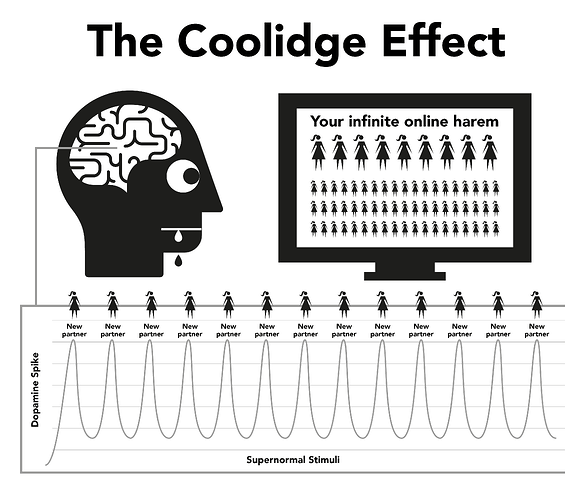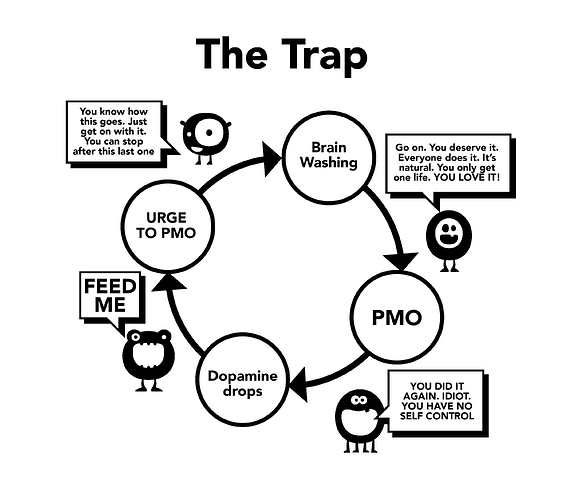Chapter 3
Why is it difficult to stop?
Reading Time: 4 minutes
All users feel something evil has possessed them. In the early days, it’s a simple question of “I will stop, just not today”. Eventually we progress to believing we haven’t got enough willpower to stop, or that there’s something inherent in 𝗉𝗈𝗋𝗇 we must have in order to enjoy life. 𝖯𝗈𝗋𝗇 addiction is like clawing our way out of a slippery pit: As we near the top, we see the sunshine, but find ourself sliding back down as our mood dips. Eventually we open our browser, and as we masturbate, we feel awful.
Ask a user, “If you could go back to the time before you became hooked, with the knowledge you have now, would you have started using 𝗉𝗈𝗋𝗇?”
“NO WAY!” would be the reply.
Ask the confirmed user, someone who defends internet 𝗉𝗈𝗋𝗇 and doesn’t believe it causes injury to the brain or downregulation of dopamine receptors: “Do you encourage your children to use 𝗉𝗈𝗋𝗇?”
“NO WAY!” is again the reply.
𝖯𝗈𝗋𝗇 is an extraordinary enigma. As said previously, the problem isn’t explaining why it’s easy to stop, it’s explaining why it’s difficult to stop. The real problem is explaining why anyone does it after getting insights on neurological damage. Part of the reason we start is because of the other tens of millions already into it, yet all of these people wish they hadn’t started in the first place, telling us it’s like living life in second gear. We don’t quite believe they’re not enjoying it, as we associate it with freedom or being ‘sex-educated’, and work hard to become hooked ourselves. We then spend the rest of our lives telling others not to do it and trying to kick the habit ourselves, often thinking we’re unique in this.
We also spend a significant proportion of our time feeling hopeless and miserable. ‘Educating’ ourselves with the supernormal makes us prefer and long for these cold images, even when warm, real ones are available. Through the constant surge and fall of dopamine induced by PMO, we sentence ourselves to a lifetime of isolation, irritability, anger, stress, fatigue, and sexual dysfunction. Using 𝗉𝗈𝗋𝗇, with its absence of the best parts of sex and connection, we end up feeling miserable and guilty.
In fact, reading about internet pornography’s addictive and destructive capabilities here and on other sites makes us even more nervous and hopeless! What sort of hobby is it that when you’re doing it, you wish you weren’t, and when you aren’t, you crave it? Users despise themselves every time they read about hypofrontality and desensitisation, every time they use behind their trusting partner’s back, and every time they can’t bring themselves to exercise after a daytime session. An otherwise intelligent and rational human being spends all their days in contempt. But worst of all, what do users get from having to endure life with these awful black shadows at the back of their mind? Absolutely nothing!
You might be thinking “That’s all very well, I know this, but once you’re hooked on these things it’s very difficult to stop.” But why is it so difficult? Some say it’s because of the powerful withdrawal symptoms, but as you’ll soon come to learn, the actual withdrawal symptoms are very mild in fact. And this is evident when you consider that many PMOers have lived and died without realising they were addicts.
Some say internet 𝗉𝗈𝗋𝗇 is free and hence humankind should claim this biological bonanza, but this is untrue—it’s addictive and acts just like any drug. Ask a user that swears they only enjoy ‘erotica’ like Playboy magazines if they’ve ever crossed the line to ‘unsafe 𝗉𝗈𝗋𝗇’. And if they are completely honest, they would confess about the times they had rationalized crossing that line, rather than not use anything at all.
Enjoyment has nothing to do with it either. I enjoy crayfish, but I never got to the point where I had to have crayfish every day. With other things in life, we enjoy them while we’re doing them, but we don’t sit around feeling deprived when we’re not.
Some say:
“It’s educational!” So how has it made you grow as a person? “It’s sexual satisfaction!” So why does it isolate you and make you feel insatiable cravings? “It’s a feeling of release!” Release from the stresses of real life? Ok, for an hour, before it all comes crashing back on you? And what stresses has it solved? “It helps me sleep” So why can others sleep just fine without it? There are many scientifically demonstrated methods to fix sleep, and more so.
Many believe that 𝗉𝗈𝗋𝗇 relieves boredom, but boredom is a frame of mind. 𝖯𝗈𝗋𝗇 will habituate you to novelty-seeking in no time, causing you to become increasingly bored until you finally participate in that wild-goose chase for just the right clip, becoming increasingly wired to seek anything that evokes novelty, strong emotion, and eventually, outrageous shock value.
Some say they only do it because their friends and everyone they know does it. If so, pray that your friends don’t start cutting their heads off to cure a headache! Most users who think about it come to conclude that it’s just a habit. This is not really an explanation, but having discounted all the usual, rational explanations, it appears to be the only remaining excuse. Unfortunately, it’s equally illogical. Every day of our lives we change habits, some of them very enjoyable. We’ve been brainwashed to believe that PMO is a habit and that habits are difficult to break.
Are habits difficult to break? Drivers in the US are in the habit of driving on the right hand side of the road, yet when travelling overseas they break the habit with hardly any aggravation whatsoever. And when you get a new job you take on a different routine, so your habits change. These may take some getting used to, but it is nothing like breaking a life long struggle with 𝗉𝗈𝗋𝗇 addiction. We make and break habits every day of our lives, so why do we find it difficult to break a habit that makes us feel deprived when we don’t have it, guilty when we do, one that we would love to break anyway, when all we have to do is stop doing it?
The answer is that 𝗉𝗈𝗋𝗇 isn’t habit, it’s addiction! That’s why it appears to be so difficult to ‘give up’. Most users don’t understand addiction and believe that they get some genuine pleasure or crutch from 𝗉𝗈𝗋𝗇. They believe they’re making a genuine sacrifice if they quit.
The beautiful truth is that once you understand the true nature of 𝗉𝗈𝗋𝗇 addiction and the reasons why you use it, you’ll stop doing it, just like that. Within three weeks, the only mystery will be why you found it necessary to use 𝗉𝗈𝗋𝗇 as long as you have and why you can’t persuade other users how nice it is to not be a PMOer!

